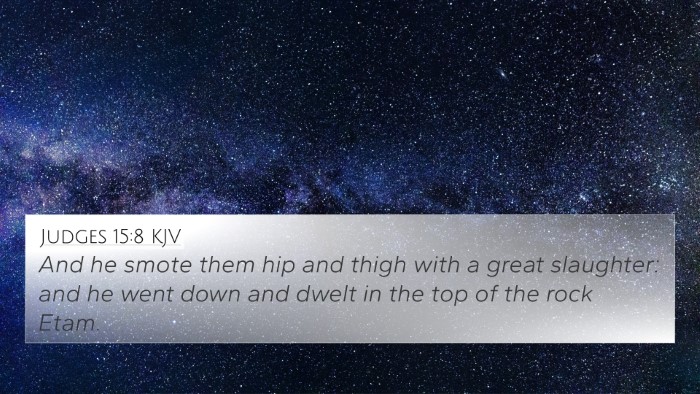Old Testament
Genesis Exodus Leviticus Numbers Deuteronomy Joshua Judges Ruth 1 Samuel 2 Samuel 1 Kings 2 Kings 1 Chronicles 2 Chronicles Ezra Nehemiah Esther Job Psalms Proverbs Ecclesiastes Song of Solomon Isaiah Jeremiah Lamentations Ezekiel Daniel Hosea Joel Amos Obadiah Jonah Micah Nahum Habakkuk Zephaniah Haggai Zechariah MalachiJob 16:14 Similar Verses
Job 16:14 Cross References
He breaketh me with breach upon breach, he runneth upon me like a giant.
Uncover the Rich Themes and Topics of This Bible Verse
Listed below are the Bible themes associated with Job 16:14. We invite you to explore each theme to gain deeper insights into the Scriptures.
Job 16:14 Cross Reference Verses
This section features a detailed cross-reference designed to enrich your understanding of the Scriptures. Below, you will find carefully selected verses that echo the themes and teachings related to Job 16:14 KJV. Click on any image to explore detailed analyses of related Bible verses and uncover deeper theological insights.

Judges 15:8 (KJV) »
And he smote them hip and thigh with a great slaughter: and he went down and dwelt in the top of the rock Etam.

Psalms 42:7 (KJV) »
Deep calleth unto deep at the noise of thy waterspouts: all thy waves and thy billows are gone over me.

Lamentations 3:3 (KJV) »
Surely against me is he turned; he turneth his hand against me all the day.

Joel 2:7 (KJV) »
They shall run like mighty men; they shall climb the wall like men of war; and they shall march every one on his ways, and they shall not break their ranks:
Job 16:14 Verse Analysis and Similar Verses
Job 16:14 - Overview
Job 16:14 states, "He breaks me with wound upon wound; He runs at me like a giant." This verse captures Job's intense suffering and the feelings of being besieged by his troubles. The imagery employed in this verse illustrates not only Job's physical pain but also the emotional and spiritual turmoil he experiences as he grapples with the seeming injustices of his afflictions.
Contextual Background
Within the context of the Book of Job, this verse is seen as a moment of deep despair. Job’s friends have come to comfort him, but they inadvertently accuse him of wrongdoing, compounding Job's pain. Rather than finding solace, Job feels as if he is under attack from both his physical ailments and from the accusations of his companions.
Commentary Insights
- Matthew Henry:
Matthew Henry interprets Job 16:14 with an emphasis on the relentless nature of Job's suffering. He notes that the "wound upon wound" signifies not just physical agony but also emotional strain. He illustrates Job as feeling overwhelmed, as if being confronted by an unyielding adversary who strikes with ferocity, paralleling Job's sense of isolation and desperation.
- Albert Barnes:
Barnes provides a detailed examination of the metaphor of being attacked "like a giant." He points out that this language indicates a powerful struggle, where Job feels dwarfed by the enormity of his afflictions. He writes that Job perceives his challenges as relentless and overpowering, leaving him in a state of utter vulnerability and despair.
- Adam Clarke:
Clarke contributes to the understanding of this verse by highlighting the emotional weight carried by the phrase "He breaks me." He notes how it signifies a deep sense of being crushed by grief and loss. Clarke stresses that Job's plea represents a deep yearning for relief and understanding amidst his suffering.
Thematic Connections
Job 16:14 intersects with several significant themes found throughout Scripture, including suffering, perseverance, and the search for divine justice. The emotional resonance of Job’s suffering in this verse invites readers to reflect on their understanding of God amid their trials. This theme can be tied to many other scriptural passages, creating a rich tapestry of biblical exploration.
Bible Cross-References
- Job 30:20: Job expresses a longing for God to answer his cries, highlighting the sense of alienation paralleling his earlier laments.
- Psalms 22:11: This Psalm captures a similar feeling of distress and abandonment, resonating with Job's sense of being forsaken in his suffering.
- 2 Corinthians 1:8-9: Paul discusses overwhelming despair in Asia, reflecting the deep suffering and reliance on God, akin to Job's experience.
- Isaiah 53:5: The prophecy of the suffering servant resonates with Job's wounds, reiterating that suffering can have a purpose tied to spiritual salvation.
- Hebrews 12:1-2: Encourages believers to persevere through suffering, a theme prevalent in Job's responses to his trials.
- Romans 8:18: Paul emphasizes that present sufferings are not worth comparing with the glory to come, paralleling Job's search for hope amidst despair.
- James 5:11: Mentions Job as an example of perseverance in suffering, encouraging believers in their trials, echoing Job’s steadfast spirit.
Practical Application
When exploring Job 16:14, readers can find encouragement in the shared experiences of suffering within the scriptures. Job's cries for understanding and relief reflect universal human themes that resonate through both Old and New Testaments, encouraging believers to seek comfort and strength in God's promises.
Conclusion
This analysis of Job 16:14 through the lenses of various commentaries illuminates the profound depth of human suffering and the quest for understanding amidst hardship. By understanding this verse in conjunction with other biblical texts, one can appreciate the connections that bind the biblical narrative together and find solace in the broader context of God's engagement with human trials.
Tools for Further Study
- Bible Concordance: A tool to find related scriptures to Job 16:14.
- Cross-Reference Bible Study: Guides to link Job’s suffering with other biblical themes.
- Comprehensive Bible Cross-Reference Materials: Resources that offer thematic connections in-depth.
- Bible Chain References: Useful for tracking similar themes and narratives throughout the Bible.



